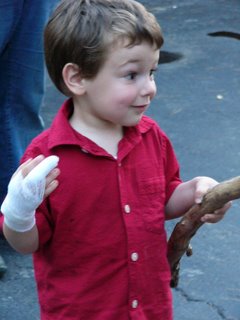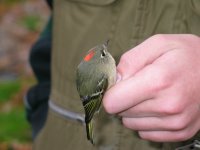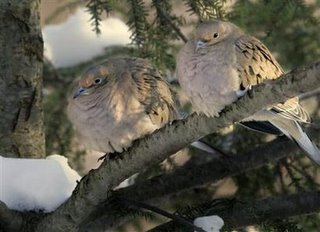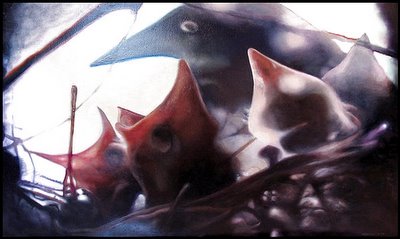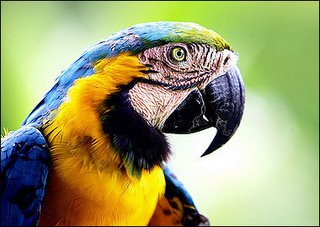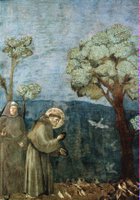
St. Ambrose of Milan
wrote to Irenaeus of Lyons in 387 suggesting he view Satan's methods as similar to a partridge. Applying Jeremiah 17:11, The Honey Tongued Doctor creates a treacherous image of the partridge, whose ultimate defeat reminds us of Christ's victory in calling souls to Heaven.
______________
LETTER XXXII
The partridge hath cried, she hath gathered what she hath not hatched. From the conclusion of my last letter I may borrow the opening of the ensuing. The question has been much mooted: with a view therefore of solving it, let us consider what natural history tells us of the nature of this bird. For it is the part of no little sagacity to consider even this, for Solomon knew the nature of beasts and of fowl, and of creeping things and of fishes!
Now this bird is said to be full of craft, fraud, and guile, skilled in the ways of deceiving the fowler, and experienced in the arts of turning him aside from her young
ones; omitting no artful stratagem which may draw off the pursuer from her nest and lurking place. And we know that on observing his approach, she beguiles him until she has given her offspring the signal and opportunity for flight. As soon as she perceives they have escaped, she also withdraws herself, leaving her enemy deluded by her treacherous wiles.
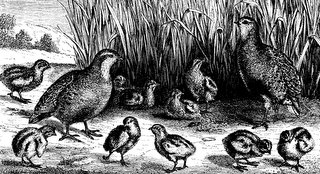
It is said also to be a bird which copulates indiscriminately, and that the male bird rushes eagerly on the female, and burns with unrestrained desires. Wherefore it has been thought suitable to compare this impure malicious and deceitful creature with the adversary and circumventor of the human race, with him who is the arch-deceiver and author of impurity.
The partridge then cried, he that is, who derives his name from destroying: even Satan, which in Latin means the adversary. He cried first in Eve, he cried in Cain, he cried in Pharoah, in Dathan, Abiram, Corah. He cried in the Jews, when they demanded gods to be made for them, while the law was being given to Moses. He cried again, when they said of the Saviour, Let Him be crucified, let Him be crucified, and, His blood be on us and on our children. He cried, when they required that a king should be given them, that they might revolt from the Lord God their King. He cried in every one who was vain and faithless.
And by these cries he gathered to himself a people whom he had not created; for God made man after His own likeness and image, and the Devil drew man to himself by the allurements of his voice: He gathered to himself the nations of the Gentiles, getting riches not by right. Wherefore it is a common saying concerning the rich and covetous man, that he is a partridge gathering riches not by right. But my Jesus, as a good Judge, does all things with righteousness, for He came saying, as it is written, I speak righteousness and judgement of salvation.
By that grace then He despoiled that partridge the Devil, took from him the ill-gotten riches, even the multitude that followed Him, recalled from error the souls of the Gentiles, and the minds of the nations that wandered from the way. And since He knew that they were beguiled by the voice of the Devil, and in order that He might Himself loose the bonds and chains of ancient error, He cried first in Abel, the voice of whose blood cried out. He cried in Moses, to whom He said, Wherefore criest thou unto Me? He cried in Joshua, He cried in David, who says, Unto Thee do I call, help me. He cried too in all the Prophets. Wherefore He says also to Isaiah, Cry, and Isaiah answers, What shall I cry? He cried in Solomon, calling to all with a very loud voice in the power of of Wisdom, Come eat of my bread, and drink of the wine which I have mingled. He cried also in His Body, as the Beam out of the timber. He cried that He might deceive and circumvent the lurking Enemy, saying, My God, My God, why hast Thou forsaken Me. He cried that He might spoil him of his prey, replying to the thief, Verily I say unto thee, this day shalt thou be with Me in Paradise. Wherefore when Jesus cried, straightway that partridge was left by those whom he had gathered in the midst of his days.
Wherefore some have thought that this also agrees with the nature of the partridge, forasmuch as it steals the eggs of others, and hatches them with its own body, seeking by this treachery to gain for itself the offspring of others. But when she whose eggs have been stolen, or nest invaded, or her young have been tempted by a fraudulent resemblance, and deceived by the appearance of beauty, when she, I say, perceives this, she 'picks out the crow's eyes as the saying is, and, being inferior in strength, puts on and arms herself with cunning. And when all the labour she has bestowed on their nurture has exhausted her store of food, and her young ones have begun to grow up, she utters her cries, and calls to her offspring with the trumpet (as it were) of affection. And they, roused by this natural sound, recognise their mother, and desert their pretended parent. And thus, seeking to gather what he has not hatched, he loses those whom he thought to bring up.
Not without need therefore was it that Jesus also cried; it was in order that the whole universe which had been deceived by the voice, the allurements, the art, the specious beauty of the partridge, and enticed by his treacherous wiles, and had wandered from the true Author of their being, might be recalled by the voice of her true Parent, might abandon this deceiver, and desert him in the midst of his days, that is, before the end of this world. From him the Lord Jesus has rescued us, and called us to eternal life. Wherefore now, being dead to the world we live to God.
When then this partridge shall have been completely forsaken by his false children, then that foolish one whom God has chosen and who has confounded the wise man, will be saved. Wherefore if any man seemeth to be wise in this world let him become a fool, that he may be wise.
Farewell my son, and love me, as indeed you do, for I love you.
_______
Let us all become fools that we may become wise.
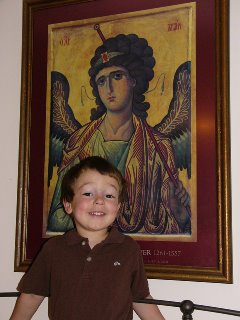 Gabriel is a tough and brave little guy. Yesterday he had his hand in the door jam as two of his brothers slammed the door. His middle finger was partially severed. My wife had a neighbor come over and then she rushed him to the ER. I missed the whole thing since I was at church with our daughter for Divine Mercy Sunday observance. Luckily the plastic surgeon was at the hospital. He and a doctor also named Gabriel reconstructed little Gabe’s finger. He told the doctors and nurses, and anyone else who would listen, that he needs his finger because he wants to be a pilot. Perhaps he has heard us caution our daughter about her hands in relation to playing the piano. My wife tells how, when they took him for x-rays and later when they stitched him up, he asked Jesus to help him and sang Hail Mary, Angel of God and Our Father prayers. Within half an hour of returning he was back outside holding the biggest stick he could find and carry with one hand.
Gabriel is a tough and brave little guy. Yesterday he had his hand in the door jam as two of his brothers slammed the door. His middle finger was partially severed. My wife had a neighbor come over and then she rushed him to the ER. I missed the whole thing since I was at church with our daughter for Divine Mercy Sunday observance. Luckily the plastic surgeon was at the hospital. He and a doctor also named Gabriel reconstructed little Gabe’s finger. He told the doctors and nurses, and anyone else who would listen, that he needs his finger because he wants to be a pilot. Perhaps he has heard us caution our daughter about her hands in relation to playing the piano. My wife tells how, when they took him for x-rays and later when they stitched him up, he asked Jesus to help him and sang Hail Mary, Angel of God and Our Father prayers. Within half an hour of returning he was back outside holding the biggest stick he could find and carry with one hand.

